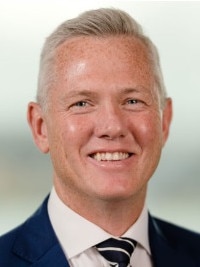In for the long-short game: Regal swoops on Magellan as Perpetual underdelivers
Active managers are struggling to attract new dollars and retain existing investors because of a growing trend towards lower-cost and often better-performing index funds.
Regal is like a “bear scooping fish from a drying river”, is how one rival described the hedge fund’s move to snap up almost 2 per cent of Magellan. It comes as the largely long-only fund manager and its bulky competitor Perpetual struggle to stop billions of dollars in funds flowing out the door.
Perpetual on Thursday announced normalised profits of $163.2m, below expectations, on the back of $5.1bn of fund outflows in the fourth quarter.
Last week Magellan also posted worse than expected earnings. Its funds under management slumped from $100bn-plus early last year to $39.2bn by the end of July. And it announced a restructure that resulted in chief executive David George – appointed to fix Magellan’s woes – having his role downgraded to exclude stock picking.
Nimble rival Regal is not having the same problems, announcing on Thursday that normalised profit after tax almost doubled to $13.1m with fund inflows of $1.1bn, taking its total FUM to $5.8bn.
Active managers that are largely long-only, like Perpetual and Magellan, are struggling to attract new dollars and retain existing investors because of a growing trend towards lower-cost and often better-performing index funds.
Regal chief executive Brendan O’Connor said his firm had an advantage because it had a strong history in long-short trading and private markets where it can achieve higher returns.
“We have a growth ambition that’s taking us into other alternative asset classes that are going to be demanded by the market over the next 10 years,” O’Connor said.
“Long-only Australian equities is not going to be a product that’s going to attract a lot of capital, as a general statement over the next 10 years.”
The sharemarket raid on Magellan could be to cover a short position, after Magellan announced a surprise special dividend last Friday. On the other hand, it could be strategic. Regal certainly isn’t afraid of taking on the big end of town, having last year tried to buy Perpetual when that firm was itself in the midst of taking over Pendal Group.
For all its talk of beneficial strategies there is no doubt a strong distribution platform would appeal.
Perpetual, meanwhile, continues to struggle to prove to investors that it was a good idea to pay $2.5bn for Pendal, having earlier purchased Trillium and Barrow Hanley, and lumber itself with more debt in the process.

Perpetual chief executive Rob Adams believes the deal will pay off, saying that when he joined the firm it had only about $20bn in assets and only in the domestic market, compared with today’s figure of $200bn across a global business.
“We didn’t have any global capabilities and increasingly our clients were allocating money to non-domestic capabilities … so we didn’t have enough avenues of future potential growth,” Adams said. “We needed to do more. That’s where the acquisitions of Trillion and Barrow and Pendal came in, to give us more platforms for future growth.”
Sadly for Perpetual, the fund outflows came even after it posted strong performances across most of its funds management units.
Perpetual announced a significant restructure on Thursday that resulted in Adams also taking on the role of chief executive, asset management, and instead of three regional divisions there will now be one global head of investment strategy who will report to Adams and will not have a role on the executive committee.
Amanda Gillespie and Adam Quaife are no longer part of an exco team that will be four people smaller, and JO Hambro boss Alexandra Altinger will leave the company.
Lafitani Sotiriou from MST Financial questioned Perpetual’s reduced financial disclosures that has emerged as part of this new restructure.
“If you’re a cynic, like me, Perpetual has cut its funds management disclosure because they don’t want us to know how the Pendal acquisition is really going,” Sotiriou wrote in a research note. “On a proforma basis, asset management is still down by 39.3 per cent versus the previous corresponding period, which is a huge drop. Given our underlying Perpetual estimates, this implies Pendal is likely down by over 50 per cent, and possibly closer to 60 per cent. We reiterate our view that the Pendal acquisition was a bad idea, and it is turning out to be a lemon.”

On the underlying profit before tax (UPBT) basis that Perpetual announced its results, the firm had a 29 per cent increase in UPBT at its asset management division to $132.7m because of the purchase of Pendal units such as JO Hambro, Pendal Regnan and TSW.
The corporate trust division’s UPBT rose 12 per cent to $81.6m on growth across all three of its business lines.
Its wealth management unit (formerly Perpetual Private) saw a 6 per cent rise in UPBT to $47m driven by a strong performance from Fordham and its specialist risk advisory business, Priority Life.
Perpetual shares fell 6.5 per cent to $23.31 on Thursday.
Analyst Nigel Pittaway from Citi said in a flash note that he was not surprised to see share price weakness after Perpetual’s result, which was a 5 per cent consensus miss.
It was “lower than both our and consensus expectations. This appears to be mostly due to lower revenue with expenses just a fraction higher than forecast. Asset management revenue is disappointing,” Pittaway wrote.
Sandon Capital founder Gabriel Radzyminski said that even on an underlying basis the result was not positive on a per-share basis due to the dilutive nature of the Pendal takeover. “When you look at the per share measure, it goes from 258 per share down to 197. This just reinforces the challenges and the difficulties of acquisitions,” Radzyminski said.
Still, Radzyminski says he believes long-only fund managers can work, and points to the beleaguered Magellan, in which he owns shares, as a case in point.
“They’ve had their challenges, but their equity strategy with Airlie has delivered exceptional returns,” he said.







To join the conversation, please log in. Don't have an account? Register
Join the conversation, you are commenting as Logout